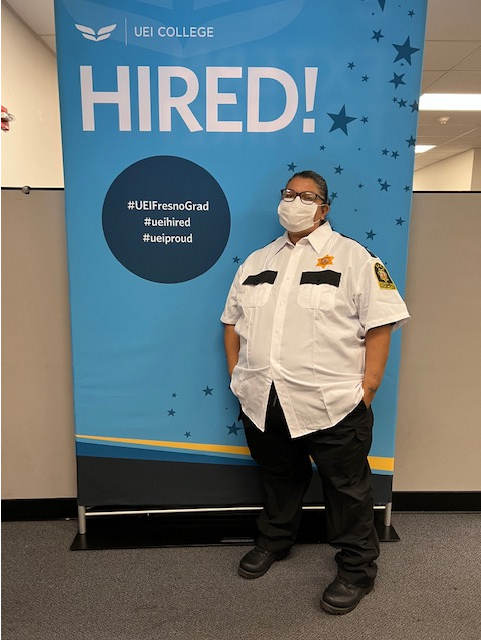How to Start a Career in the Criminal Justice Field?
| Update: September 05, 2024
If you binge on true crime shows and dream of making a significant difference in the world, a career in the criminal justice field may be for you. Criminal justice is a field full of opportunities to help people, protect the innocent, protect property, change lives, and provide purpose.
If you’ve always dreamed of working in a criminal justice or law enforcement position but are worried the schooling to achieve your dream may be too intense, you may be surprised to learn how UEI College’s Criminal Justice Diploma Program can help jump-start your career and prepare you for an entry-level position in as few as ten months.
If you’re interested in pursuing a career in the criminal justice field, consider enrolling in UEI College’s Criminal Justice Program. You can earn your diploma in as little as 10 months, placing you on track to beginning a new and rewarding career in the criminal justice field.
What Careers Does the Criminal Justice Diploma Program Prepare You For?
UEI’s Criminal Justice Diploma Program provides students with the knowledge and training to prepare for a variety of entry-level criminal justice positions. Our program gives a foundational understanding of how the criminal justice system works, control techniques, report writing, professional communication, and observation skills. In the end, graduates will be prepared for these entry-level positions:
- Security Officer: Security officers may work in a variety of settings protecting buildings from vandalism, protecting individuals, or ensuring safety in public settings. Security officers may work for businesses, government agencies, or private individuals. These individuals are needed at all hours to ensure people’s and property’s safety.
- Hotel/Retail Loss Prevention: Hotel and Retail Loss Prevention Specialists keep an eye out for anyone who attempts to steal from a hotel or retail business. This position requires great attention to detail, observation skills, and knowledge of control techniques. It also requires excellent communication and people skills so customers and guests can feel comfortable with their presence.
- Emergency Dispatcher: Emergency dispatchers answer emergency calls and help direct law enforcement officers who are responding to the incident. Individuals in this position must be able to remain calm during stressful situations and be able to de-escalate situations. They must also have the ability to multi-task to ensure the caller feels comforted while responders are on their way.
- Private Investigator Employee: Private Investigators search for information about a person’s legal, financial and personal background. They may hire recent graduates to help them complete tasks, stay organized and find answers.
- Store Detective/Retail Security: Retail Security Guards patrol large stores and malls and keep an eye out for anything suspicious. This position requires good attention to detail and observation skills. It may also require good technical skills to be able to monitor areas using surveillance equipment.
“In addition to the personal satisfaction that comes with helping others, Criminal Justice has many varying career sub-paths, all of which promise excellent pay and benefits,” said Christopher Hulsey, Criminal Justice Instructor at UEI. “This means that someone going into this career could easily support their family.
How to Start a Career in the Criminal Justice Field?
Step 1. Obtain a high school diploma or GED.
A high school diploma is the minimum education requirement for most criminal justice careers. So, if you already have your high school diploma, you’re ready to continue your education and train to earn your criminal justice diploma.
Step 2. Seek Career Training.
There are many different paths to go in the criminal justice field and many avenues to get there. Good training will help you decide which career may be best for you and give you a solid foundation for entering the field.
The criminal justice field can be stressful and challenging. It’s not a good fit for everyone. A good criminal justice training program will prepare you with the technical knowledge you need and some tactics for handling stress, de-escalating a situation, and mentors that understand the emotional toll you may be facing.
What employers in the criminal justice field want to know is that you have the right personality, skills, and knowledge to do the job well. An excellent way to prove your knowledge and abilities quickly is by earning a criminal justice diploma through UEI College.
Our criminal justice diploma program covers a variety of topics, including private security, criminology, crime scene terminology, surveillance, the legal system, gangs, and drugs. It will prepare students for an entry-level criminal justice career and provide a solid foundation for a long career in the criminal justice field.
“One part of our program which seems to be a favorite for the students is our hands-on element,” said Criminal Justice Instructor Christopher Hulsey. “Students enjoy practicing in-class skills such as; handcuffing, dispatch communication, use-of-force exercises in the incident simulator, live contact scenarios, mock-traffic enforcement, and de-escalation training. Unlike other schools that only teach you the concepts and theories of criminal justice, the physical labs we conduct here at UEI actually teach students the mechanics, and methods of security, corrections, police, as well as other aspects of the criminal justice field.”
Step 3. Prepare For the Hiring Process
There is a great need for well-trained professionals in the criminal justice field, but getting hired can be competitive and sometimes frustrating. Many organizations will require a physical exam, interview, background check, drug test, credit check, references, and more to get started. Graduates should be prepared to prove their skills and ethics and be resilient in the face of denials. You can be prepared for these tests by being honest in your answers and prepared with an explanation for any red flags in your past. You should also choose your references carefully and focus on references you have a professional connection with.
Graduates of UEI College can work with our Career Services department to help prepare their resumes, find opportunities in their area, and prepare for the hiring process. Our experienced instructors are also an excellent resource for students as they may have connections in the field and experience applying for those positions. UEI College’s Criminal Justice Program prepares students for entry-level positions in this field, including security guard, theft prevention officer, retail security guard, or emergency dispatcher. Additional training and experience will help further your career opportunities.
Step 4. Search For a Position
Compassionate and enthusiastic criminal justice professionals are a necessity in the field. With the right combination of training and professionalism, you can find an entry-level position as a security guard, retail security guard, loss prevention officer, or emergency dispatcher. If you find criminal justice is something you’re passionate about, working hard, continuing your education, and gaining experience can help you reach any position you set your mind to.
“Depending upon your personal career goals, criminal justice has a vast scope of options available to those who go down this path. Security patrol, security supervision, armored transport, Federal Transportation Security Administration (TSA) officer, police officer, Bail enforcement officer, corrections officer, juvenile corrections officer, probation officer, parole officer, United States Marshal, Secret Service agent, Community Service Officer, park ranger, game warden, loss prevention/asset protection, and these are just to name a few of the options in criminal justice.”
Do You Need a College Degree to Begin a Career in the Criminal Justice Field?
While many criminal justice positions ask for a bachelor’s or associate’s degree, you can enter the criminal justice field in an entry-level position without having a college degree. Most entry-level positions do not require a college degree, and you may be surprised how far you can go with the experience and training listed on your resume. The right combination of skills, training, and experience can be precious. You can stand out as a qualified candidate for an entry-level position in the criminal justice field, as a security guard, theft prevention officer, or emergency dispatcher, in as few as ten months with training from a trade or vocational college like UEI College.
The criminal justice program at UEI will teach you arresting techniques, duties, and functions of a security team, how gangs operate in America, how to manage those who have been accused of a crime and how to use the technology used by law enforcement teams. We’ll also cover securing a crime scene and investigating a scene as well. This training will provide students with a stepping-stone for beginning their careers in the criminal justice field.
What Are the Educational Requirements to Enroll in UEI’s Criminal Justice Program?
At UEI, we can help you begin training for a career you can be proud of, no matter your personal background or experience with your education. We offer programs for various careers in the criminal justice field.
To enroll, you must be at least 17 years old and have a high school diploma or GED. There is no maximum age to enroll because you are never too late to change your career or learn something new.
If you’ve dreamed of a career in the criminal justice field but were unsure how to get started, we invite you to learn more about UEI College by giving us a call or filling out an online inquiry form today.
What Do You Learn in the Criminal Justice Program at UEI?
Students in the Criminal Justice Program at UEI learn techniques and tools to manage safety and security and gain foundational knowledge of how the criminal justice system operates in America. Students have the opportunity to put these skills and knowledge into practice with hands-on exercises and drills. Through nine program modules, students will be introduced to the following:
- The history and ethics of private security
- Legal powers of private security guards
- Patrol techniques for security guards
- Report writing
- Liability
- Making arrests
- Skills needed to manage prisoners accused of crimes
- Differences between detention facilities, jails, and correctional facilities
- How to use handcuffs, ankle cuffs, and chemical agents
- Reporting processes in correctional facilities
- Basic forensic and crime scene processing
- Recovering fingerprints, blood splatter, and ballistics
- Preservation of evidence
- How to protect a crime scene
- Interviewing witnesses
- Identifying leads
- How to maintain a chain of custody
- Surveillance and undercover techniques
- How to operate surveillance tools
- Difference between types of investigations
- Professional communication
- Conflict resolution
- Problem-solving
- Crimes, laws, and the statute of limitations
- The letter of the law vs. spirit of the law
- Methods of terrorism and counter-terrorism
- Assessing threats
- Observation skills
- Victim’s rights
- Criminal profiling
- The role of the criminal justice system
- Reasons for the existence of gangs
- Preventing gangs
- The connection between gangs, drugs, and prisons
- Effects of illegal drug use
- Various methods of communication
- Modern technology in security
- Emergency radio codes
During hands-on lab time, students will practice making arrests, securing a crime scene, performing surveillance, and taking emergency calls about domestic violence, active shooters, assaults, and more. At the end of the course, students should understand how the criminal justice system works, the opportunities for career advancement, and the techniques used in an entry-level position.
“I think the students like the hands-on training that they receive at UEI College,” said Criminal Justice Instructor Charles Cunha. “They get to experience real-life like scenarios in a training environment where they aren’t afraid to learn. They enjoy the training because they receive the knowledge and skill set that they desire.”
What Should You Look for in a Criminal Justice Program?
If you’re considering seeking training in the criminal justice field through a vocational school or trade college, there are several things you should look for.
Flexibility.
Look for a program that offers flexibility that fits your schedule. UEI College’s Criminal Justice Program is offered in a hybrid schedule. Students take part in online lectures and complete homework assignments and quizzes virtually through any device. Twice a week, students come to the campus to practice these concepts through hands-on labs. We also offer daytime and evening courses.
Hands-on Experiences.
Careers in the criminal justice field are typically very hands-on, so it is important to be able to practice tactical skills in person. Arresting techniques, using security equipment, and patrolling techniques should all be practiced under the supervision of an experienced instructor. Students should also have the opportunity to practice setting up a crime scene perimeter and investigating a mock crime scene.
Support.
When looking for a criminal justice training program, you should also take a good look at the support offered through the school. UEI College is set up with ambassadors and mentors to help students feel comfortable and accepted. Tutoring and extra lab time are available for students who need it. We’ll also help build a resume you can be proud of and locate job opportunities in your area after graduation.
“If you are looking for a challenging and rewarding career, Criminal Justice is the profession for you! There are an abundance of opportunities in the criminal justice profession,” said Criminal Justice Instructor Charles Cunha. “You can be a Security Officer or U.S. Border Patrol Agent, Police Officer, Corrections Officer, Crime Scene Technician, Crime Analyst… the list goes on… You can also study other disciplines that relate to criminal justice such as chemistry, biology, anthropology, entomology, odontology, psychology… and still find a career in criminal justice. UEI College is your first step in your quest to finding a rewarding career.”





